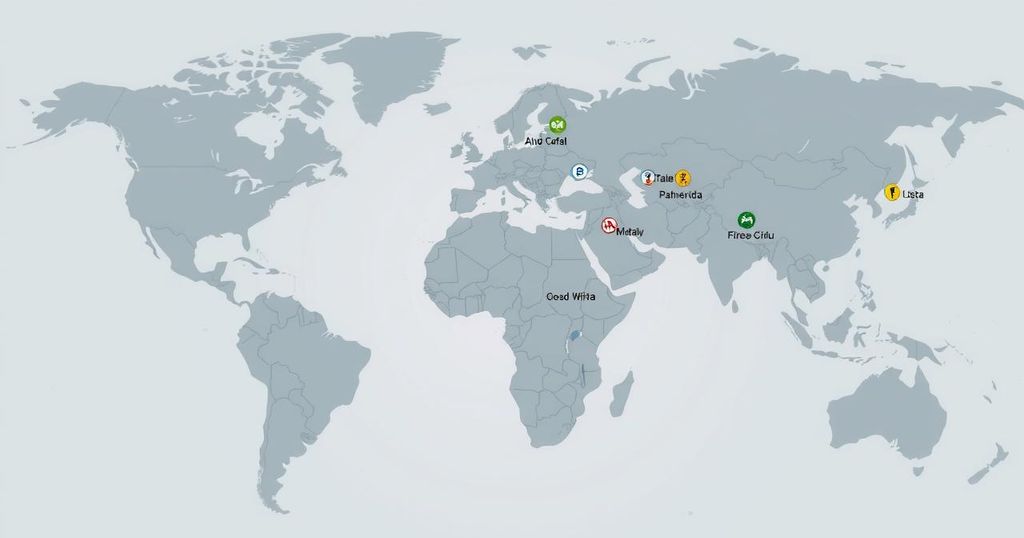The U.S. Department of State has issued Level 4 travel advisories for numerous countries, citing increased risks due to crime, instability, and violence. Destinations including Afghanistan, Venezuela, and Lebanon are notably affected, prompting the government to warn against travel. The advisories highlight significant security concerns as spring break approaches, necessitating informed decision-making for travelers.
In a recent update, the U.S. Department of State has escalated travel advisories for several prominent spring break destinations, including Russia, Jamaica, Colombia, Belarus, Yemen, Syria, and others. The advisories have transitioned from Level 3 (Reconsider Travel) to Level 4 (Do Not Travel) due to concerns regarding crime and political instability. This shift highlights the increasing security risks faced by American travelers as the spring break season approaches.
Historically, many of these countries have attracted American tourists for their rich culture and beautiful beaches. However, rising violent crime incidents such as armed robberies, kidnappings, and civil unrest have prompted the government to issue strong warnings for American citizens. The travel advisories aim to safeguard travelers from the significant risks now present in these popular locales.
Global security concerns have led to a rise in Level 4 travel advisories, indicating that ongoing conflicts and extreme conditions deem them dangerous for American travelers. The U.S. Department of State issues these advisories to alert citizens to significant threats regarding safety at widely recognized tourist destinations.
Looking ahead to 2025, these advisories reflect worsening safety situations worldwide, urging American tourists to reconsider plans in regions experiencing some of the most severe crises. This article investigates the specific reasons for these advisories and the implications for global tourism.
Understanding the U.S. travel advisory system is essential, as these color-coded advisories provide essential information on safety risks abroad. A Level 4 advisory signifies serious threats, usually associated with significant violence, unrest, or ineffective governance.
As of February 2025, several countries have received Level 4 travel advisories due to dangerous conditions. For instance, Afghanistan still faces extreme dangers due to the Taliban’s resurgence, leading to significant risks for American citizens amid ongoing violence and limited emergency services.
In the Democratic Republic of the Congo, armed groups frequently engage in violent acts. Continuous civil unrest and illness outbreaks have worsened safety threats, leading the U.S. to advise against all travel to this region due to the high risks of crime and violence.
Lebanon’s political instability and economic downturn, coupled with increased risk of terrorism, have triggered a Level 4 advisory. Despite its rich cultural appeal, the country’s current conditions compel the U.S. government to advise against travel to safeguard visitors.
The Central African Republic also poses notable risks due to persistent armed conflicts and violence from militias, with little law enforcement protection for citizens or travelers.
Belarus remains under pressure from political repression, with ongoing protests potentially endangering U.S. travelers. The increasing tensions have posed risks of harassment or arrests, leading to strategic advisories from the government.
Iraq continues to be a site of instability due to the presence of ISIS, with travelers facing immense risks of violence and kidnapping. The government advises against any travel in light of these threats.
The war in Ukraine, ongoing since Russia’s invasion in February 2022, has caused severe destruction and thus led to travel advisories against visiting amid active conflict zones and civilian casualties.
In Venezuela, the government’s political crises and economic deterioration contribute to a breakdown in public services and insecurity, leading to a strict advisory against travel.
Haiti remains troubled by political conflicts and gang violence, particularly in the capital. Public unrest further complicates conditions for travelers, thus meriting a Level 4 travel advisory.
Iran’s current political climate poses significant risks for American citizens, with potential detentions for political reasons being a critical concern.
The common themes among these countries involve significant conflict, political instability, and violence threats, motivating the U.S. to enforce comprehensive travel advisories. Travelers must remain aware of these critical warnings, even if some choose to visit these destinations.
Travelers considering high-risk locations must prioritize their safety by following guidelines from the U.S. State Department’s travel advisory website, enrolling in programs like STEP, securing comprehensive insurance, and maintaining communication with local embassies.
The implications for the travel industry are profound: as airlines and tour operators realign their services according to the evolving security landscape, demand for insurance covering emergencies may rise significantly. The travel sector must adapt to ensure customer safety while providing updated information about travel destinations.
The travel advisory system evaluates safety by considering various factors, including crime rates, political conditions, and emergency service availability. Nonetheless, many spring break tourists continue to flock to these destinations despite risks, signaling an essential need for heightened awareness and careful trip planning.
As spring break approaches, it is critical for U.S. travelers to recognize the increased safety risks across popular destinations in Latin America and the Caribbean. The heightened advisories serve as a serious reminder about travel security, while the travel industry adjusts accordingly. Tourists are encouraged to remain vigilant as they plan their travels, emphasizing safety to enhance their vacation experiences.
The U.S. Department of State’s recent travel advisories underscore the heightened safety risks in numerous destinations, particularly as spring break approaches. Countries like Afghanistan, Venezuela, and Iraq are especially concerning due to ongoing violence and political instability. Travelers are urged to heed these warnings, heed precautionary measures, and ensure they remain informed while planning their trips to maintain a safe travel experience. The travel industry must adapt to these realities, prioritizing updated safety protocols and resources for travelers.
Original Source: www.travelandtourworld.com




